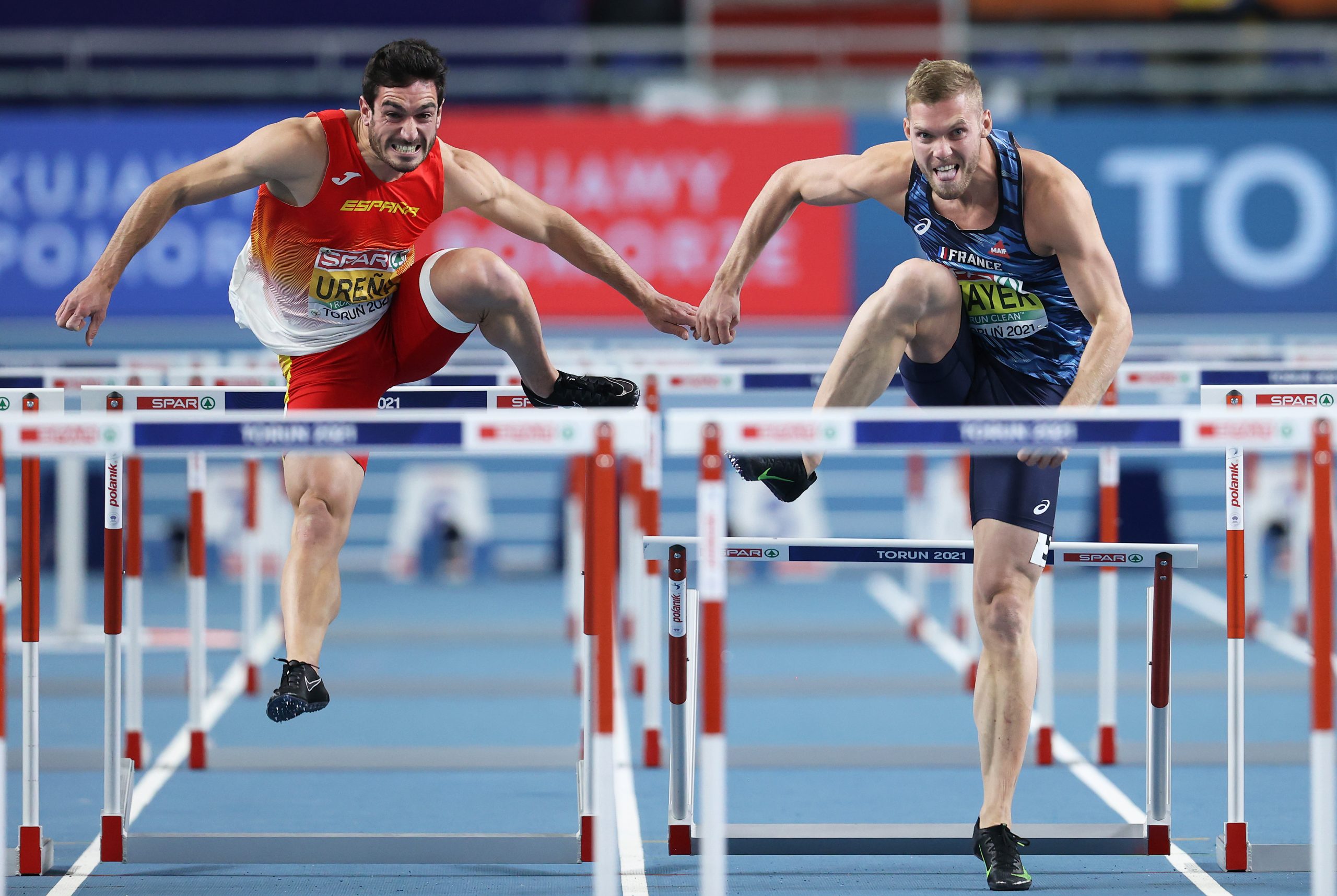In the first major championships since the start of the pandemic, the 24 best multieventers in Europe gathered to compete in Toruń in Poland at the European Indoor Championships. In both competitions, the fields were split between experienced athletes and young athletes navigating their first big championships.
Over the course of the 3 days, we would see national records, world leads, inspired home nation performances, the magic of the all-time greats, the excitement of new talent and of course – and more than once – the dreaded multievent XXX.
PENTATHLON
The star attraction in the pentathlon was the Olympic Champion Nafi Thiam, although her presence had been in doubt after a series of mixed results in Covid tests. But she made it to the first discipline, fit and healthy.
The hurdles were an exciting start to the competition, and 20-year-old Holly Mills edged 20-year-old Annik Kälin in 8.22 to 8.23. Behind them Xénia Krizsán and Noor Vidts both ran identical PBs of 8.27, and their head-to-head would continue throughout the competition. Nafi delivered a solid time of 8.31, the same as 19-year-old Maria Vicente.
But unfortunately, that was the end of the competition for Annik Kälin. She hit the last hurdle and aggravated a back injury, so disappointing after a season in which she set a Swiss national record in pentathlon. The subsequent competition was lesser for her absence, and we wish her well for a speedy return.
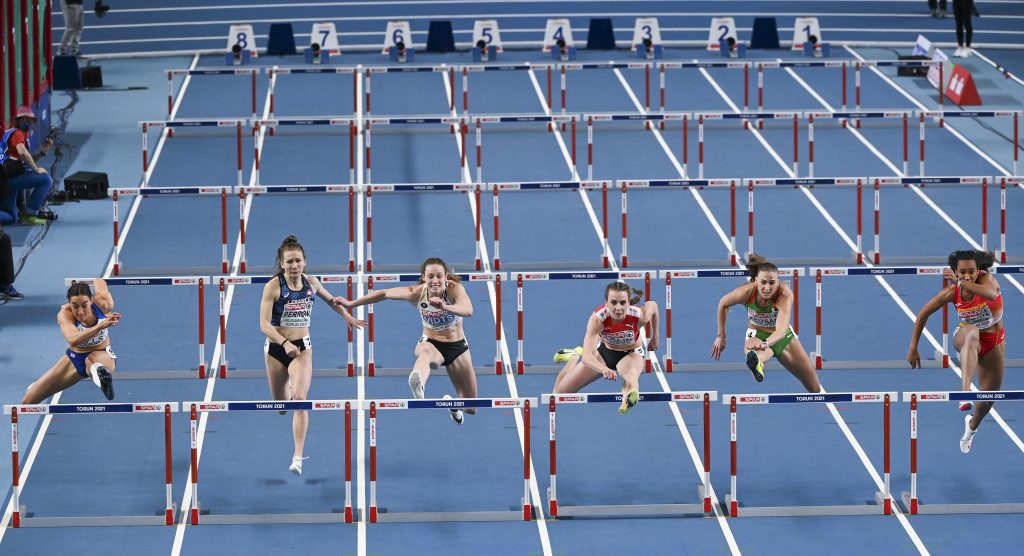
Onto the high jump and the bulk of the field cleared the same height of 1.77: Adrianna Sułek, Rita Nemes, Maria Vicente, Xénia Krizsán, Nadine Broersen and Ivona Dadic. The three stand-out jumps were Paulina Ligarska at 1.80, Noor Vidts at 1.83 and Nafi with 1.89 (modest by her standards).
Nafi took over the lead from Holly Mills with 2152 and was never headed from that point onwards. And so, the real competition moved into the next tranche of athletes, with only 100 or so points separating most of the rest of the field.
Onto the shot and it became clear that Noor was in the same sort of form that led to her world lead of 4665 in Clermont Ferrand. After a PB in the hurdles (8.27) and an equal PB in the high jump (1.84), she added a season’s best in the shot (13.83).
Similarly, Xénia had secured a PB in the hurdles (8.27) and did the same in the shot with her third round throw of 14.48, the longest of the day bar Nafi (15.16).
After the shot, while Nafi led with 3024, Noor (2867) and Xénia (2835) were only 32 points apart in 2nd and 3rd place respectively, with Broersen and Dadic close together some 80 points further behind.
Maria Vicente had had a solid performance thus far and would have expected to make up points in the long jump, given her (cruelly unmeasured) 6.60m+ performance at the Spanish championships a few weeks earlier. But unfortunately, she had 3 no jumps and her challenge was over. Broersen had the same fate, although she decided to continue.
Nafi leaped 6.60, an indoor personal best, for the longest jump of the day. Celia Perron, who had joined the field after the last minute positive Covid test of Henriette Jaeger, equalled her PB of 6.15. Meanwhile, Noor had landed yet another PB, 6.47m, and began to stretch away from Xénia. She would need every point she could, since Krizsán’s 800m best was 4 seconds faster.
After 4 events, Nafi led with 4064, Noor second in 3864 and Xénia third in 3715. Ivona was only 15 points behind Xénia, and with similar pace over the 800m, it was not inconceivable that the Austrian might snatch the bronze.
But the positions stayed as they were. Holly Mills took out the early pace, before being overtaken by Krizsán and Vidts, who crossed the line together in 2:12.49 and 2:12.59 (a 2-second PB for Noor) respectively.
Nafi finished with gold in a national record and world lead of 4904, Noor silver with a 126 point PB of 4791, and Xénia bronze with 4644. A Belgian 1-2, and Hungary’s only medal of the championships.
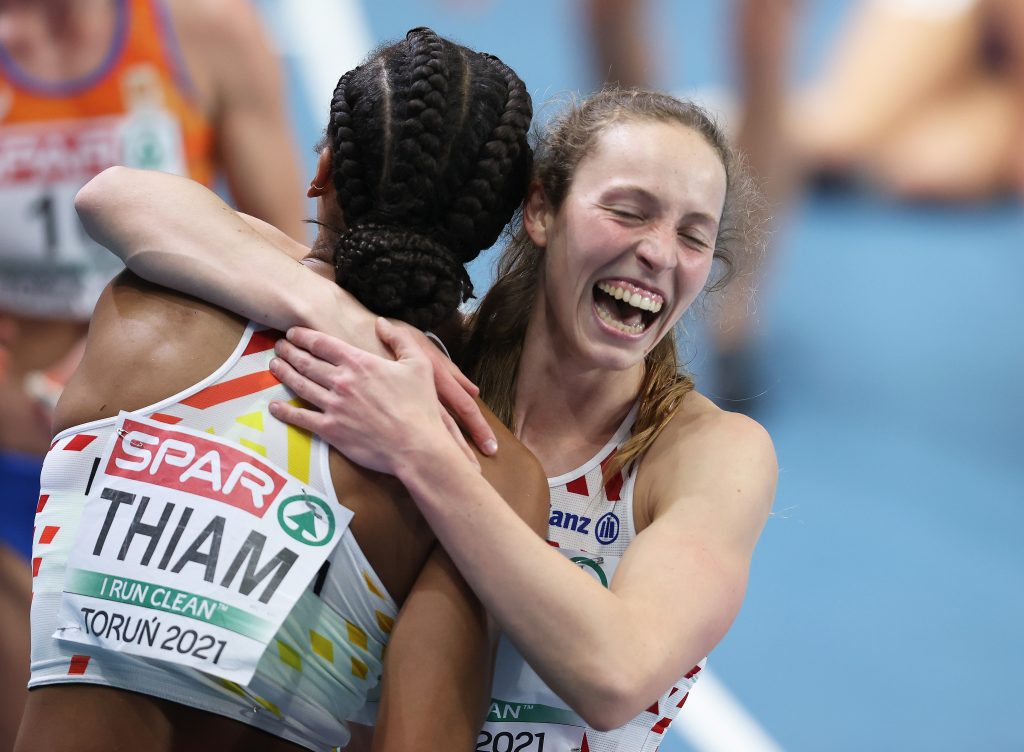
“We went in without any expectations”, said Noor, “like we do for each competition, but it went really, really well. I’m really happy with each event. I did 3 PBs and 2 SBs and the total score is really high, so I’m really happy with the result.”
And the Olympic champion said: “I am really happy with the NR because I never prepare specifically for the indoor season. I am also very happy for Noor. She deserves it and exploded her PB! It is good for the combined events in Belgium to have to girls on the podium.”
HEPTATHLON
60M
The two fastest men in the field were Simon Ehammer and Kevin Mayer, and they were positioned 4 lanes apart, Simon in lane 4 and Kevin in lane 8.
Simon got a superb start and flew to 6.75s, 6 hundredths faster than his previous best, and one tenth ahead of Kevin in 6.86. Ehammer ran as fast as Karl Robert Saluri in Glasgow in 2019 when the Estonian set the championships heptathlon best. And he was only 3 hundredths slower than the greatest of all the Estonians, Erki Nool, when Erki set the European heptathlon 60m best of 6.72 in 1999, a year before Ehammer was born.
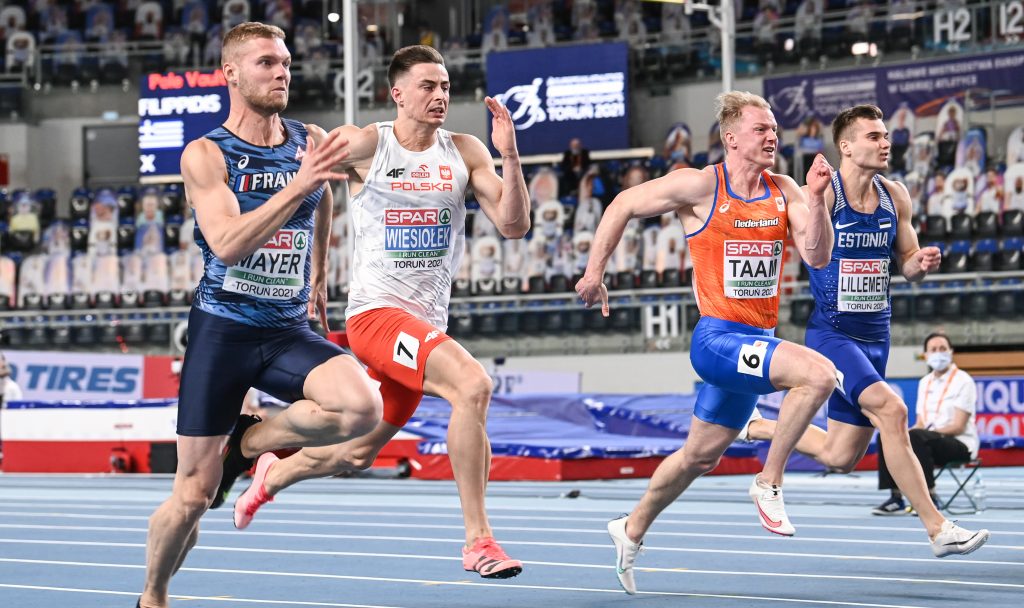
Rik Taam, Paweł Wiesiołek and Dario Dester all also ran under 7 seconds.
After one event:
- Simon 973
- Kevin 933
- Rik 904
- Paweł 900
- Dario 893
- Andreas Bechmann 875
- Jorge Ureña 872
- Risto Lillemets 868
- Maksim Andraloits 840
- Kai Kazmirek 830
- Darko Pešić 809
- Pieter Braun 796
LONG JUMP
Much of the pre-event commentary focused on the world record holder, suggesting that he was head and shoulders above everyone else, and that it would be a one-man show. Well, he might have previously scored several hundred points more than anyone else in the field, but it certainly wasn’t a one-man show.
In fact, Kevin only had the 4th best long jump of the day, with 7.47m. His series was consistent: 7.40 in the first round, then 7.45 and then out to 7.47. Simon’s jumps in the first two rounds were also consistent, 7.61 and 7.49. But if Ehammer was going to make any kind of progress against Mayer and avoid Kevin running away with the title from the second event, he would need to max out his strong events. And so, he did. In the final round, the 21-year-old unleashed a jump of 7.89, his longest jump of 2021 and an indoor personal best.
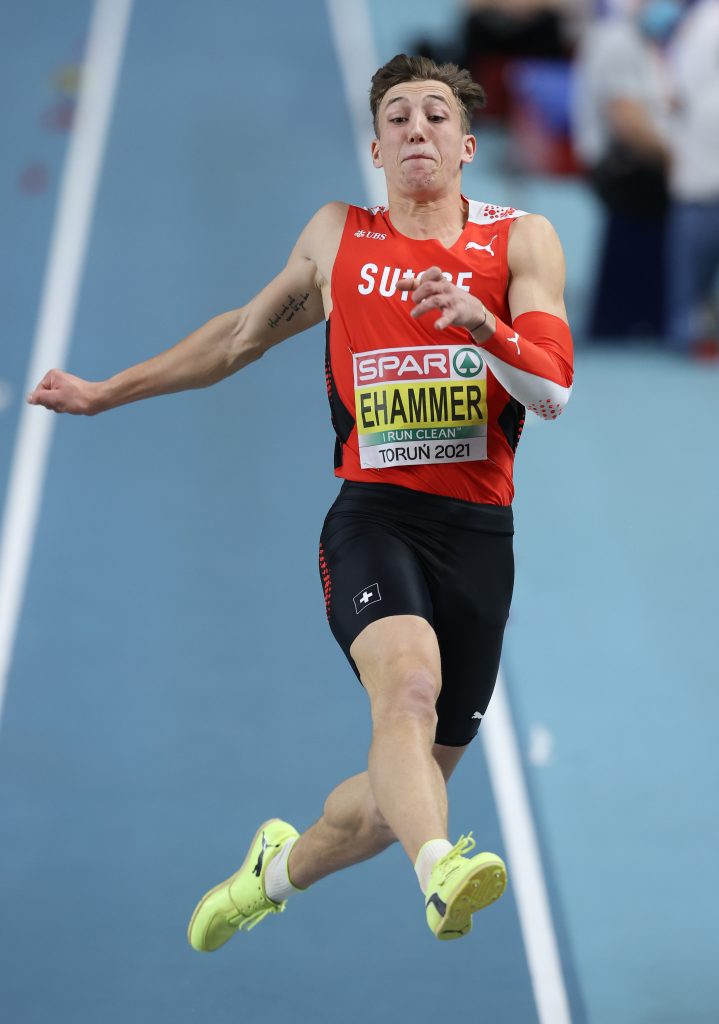
Jorge, coming into the competition after an ischiotibial injury, was solid with 7.33 and Paweł reached a similar distance, with 7.31.
The best jumps behind Ehammer came from Dario Dester (7.61) and Andreas Bechmann (7.49), both just centimetres below their lifetime bests. Rik Taam also came close to his lifetime best with 7.29, and Risto Lillemets equalled his PB with 7.28.
Kai Kazmirek – in his first European Indoors – managed one jump of 6.55 in the first round but then withdrew from the overall competition with back trouble.
After 2 events, Ehammer had stretched his lead to 146 points over Mayer, with Dester 5 points behind Mayer, and Bechmann 48 points further behind in 4th. So far, the youngsters were everywhere Mayer looked – in front of him and packing in behind him.
- Simon 2006
- Kevin 1860
- Dario 1855
- Andreas 1807
- Paweł 1788
- Rik 1787
- Jorge 1765
- Risto 1749
- Pieter 1701
- Maksim 1630
- Darko 1611
SHOT
Over half the field have thrown over 15m in their careers, so some big throws were guaranteed. And in the first round, Pieter Braun set the tone, with a lifetime best of 15.40. Dario Dester did likewise in the third round, extending his best to 14.25.
Darko Pešić was a little below his best, still with a big throw of 15.89 in the first round, but we weren’t treated to his 16.60m+ effort from his guest appearance at the Serbian champs a few weeks previously. But we did see one 16m throw. In the first round, Kevin reached a solid 15.03. In the second, he extended it to 15.23. And in the third round, straining every sinew, he roared his way to a new indoor best of 16.32.
Ehammer delivered a solid 14.75 in the second round to retain his lead – but the world record holder was looming larger and larger in his wing mirror, now less than 50 points behind. And Paweł continued his charge, closing in on Dario, with a hefty 15.27 in the final round.
After 3 events:
- Simon 2780
- Kevin 2731
- Dario 2599
- Paweł 2594
- Rik 2547
- Jorge 2528
- Andreas 2523
- Pieter 2515
- Risto 2508
- Darko 2455
- Maksim 2424
HIGH JUMP
Every man in the field has jumped over 2m in their career, so again we were promised a good show. In theory, Ehammer should have been in a position to retain his lead through the first day and at least until after the hurdles on Day 2. Kevin had not jumped over 2m since his world record in Talence in 2018 (he jumped 1.97 in Réunion), and Simon had jumped over 2.02m already this year.
But it didn’t work out that way. Despite a niggle in his neck that bothered him during both vertical jumps, Mayer cleared 2.04 to Simon’s 1.95. Those 9cm and 82 points finally put Kevin in the lead, turning Simon’s 49 point lead into a 33 point deficit.
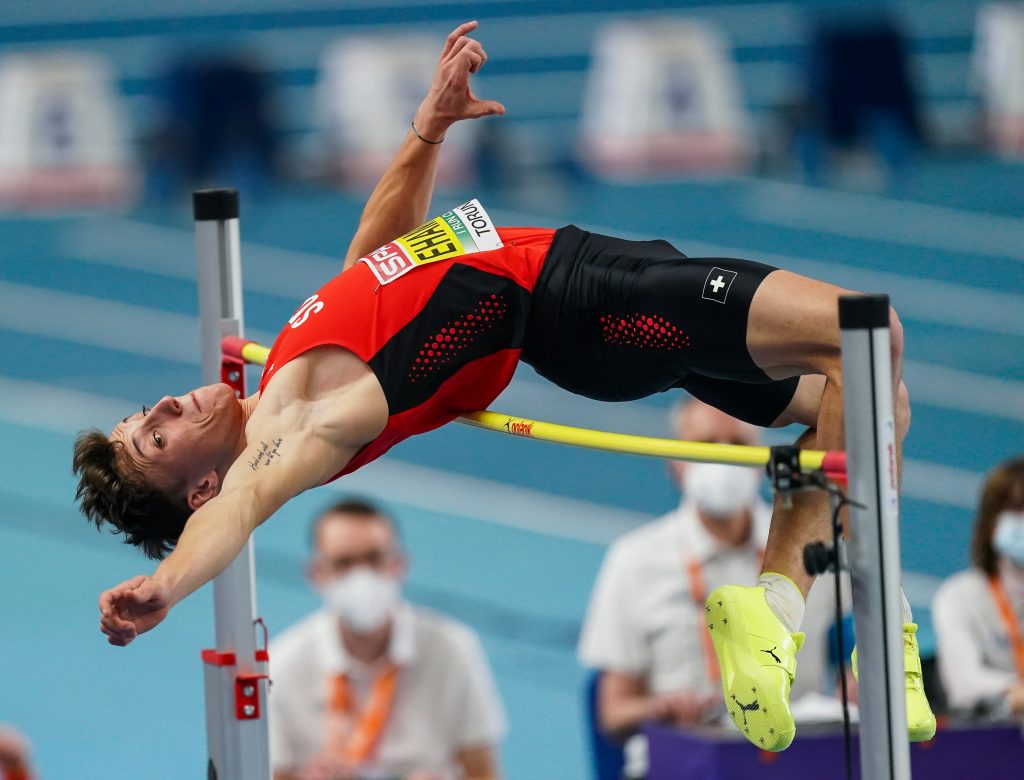
From this point forward, only Kevin Mayer could get in the way of himself winning gold. The fastest hurdler, the highest vaulter, and a competent 1000 runner.
Rik and Risto also cleared 2.04. But the big jumps came at 2.10, achieved by Maksim Andraloits, Andreas (matching his PB of a few weeks earlier in Frankfurt) and Jorge. And at this point, Jorge made clear that he wasn’t just along for the ride as defending champion. He had climbed from 7th place to 6th and then into 3rd. He wanted a medal.
Unfortunately, Pieter Braun withdrew after the HJ after twisting his ankle.
“It is good to be hunted by my opponents,” said Kevin Mayer after Day 1. “I feel good, I just decided not to continue [in the high jump] to make sure I do not get into complications and to spare some energy. I feel confident and looking forward tomorrow.”
After Day 1:
- Kevin 3571
- Simon 3538
- Jorge 3424
- Andreas 3419
- Paweł 3407
- Rik 3387
- Dario 3357
- Risto 3348
- Maksim 3320
- Pieter 3300
- Darko 3268
60m HURDLES
Day 2, and Kevin came into the hurdles with his 7.68 from Liévin under his belt. While Simon has a faster time than Kevin outdoors, the Swiss still lags behind the Frenchman indoors, with a best of 7.80. But with Jorge (7.78) also in the same heat, it promised to be an electric race.
And it was, but it was much closer than it might have been. Kevin “only” ran 7.78 and Simon just 4 hundredths behind him in 7.82. That only allowed Kevin to stretch his lead by a further 10 points to 43 points. The “one-man” show label could not be further from reality.
Jorge ran 7.87 for third, and unfortunately Maksim Andraloits experienced the same fate as Kai Kazmirek in Doha and stumbled, veering off the track and out of the race. Risto Lillemets had the best performance outside the top 3, running 8.09, close to his best of 8.07 set in Tallinn earlier this year.
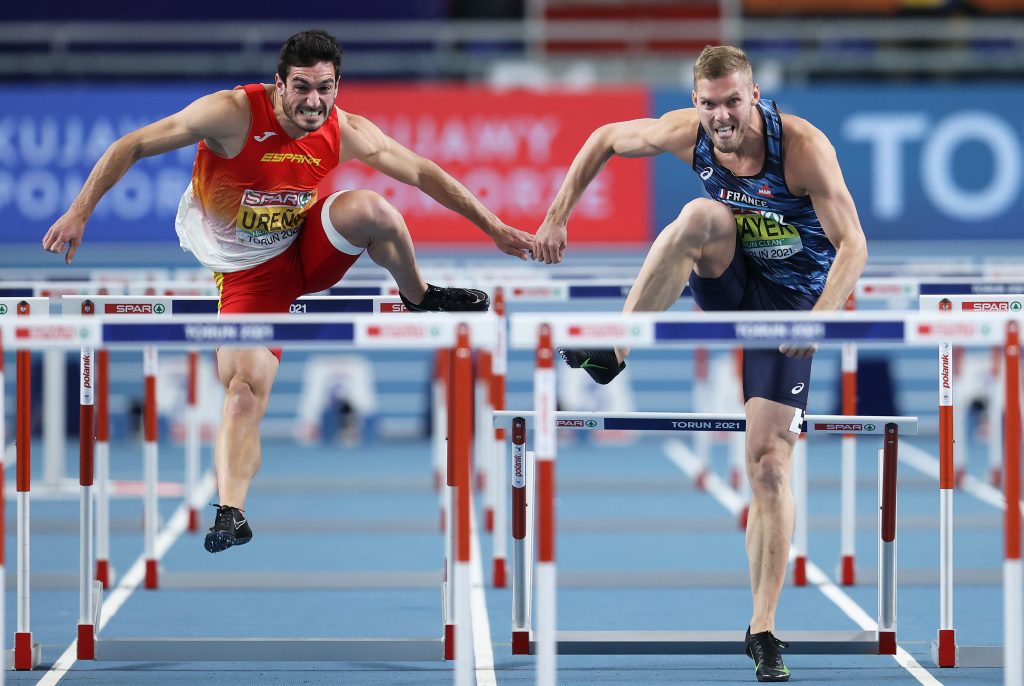
While Kevin and Simon were close at the top of the table, Jorge was clear in third 127 points behind. Rik was a further 103 points behind in 4th, but only 74 points covered him, Paweł, Risto, Dario and Andreas.
Going into the penultimate event, the medals seemed more or less settled. Simon and Jorge were of similar calibre in the pole vault, and while it might be close in the last event given Jorge’s superior 1000m time, it was hard to see how anyone else could feature.
After 5 events:
- Kevin 4609
- Simon 4566
- Jorge 4439
- Rik 4336
- Paweł 4322
- Risto 4307
- Dario 4277
- Andreas 4262
- Darko 4198
- Maksim 3320
POLE VAULT
So, there we were again at the pole vault. Kevin Mayer has a PB of 5.60, some 40cm better than anyone else in the field, and had already vaulted 5.30 this year off only 10 steps. Only disaster could prevent Mayer from winning gold, although by this time he was diverging from the path he would need to break his own European record of 6479.
But disaster did strike. Not for Mayer, though, for once.
Despite entering at what should have been a very, very safe height, Simon no-heighted at 4.50. History was repeating itself, just a month after he had the same fate en route to a massive score in Magglingen. Ehammer was out, plummeting from a safe medal position down towards the bottom of the standings.
“I don’t know what it is about the jumping the last months,” Simon said after the vault. “In Frankfurt my pole vault was really good and also during training. But today, I can’t explain it. I just had a blackout. I have to learn to deal with this.”
At the same time, Dario Dester was unable to match his audacious 5m at the Italian champs and he also went out at 4.50 after clearing his opening height of 4.40. Darko had a decent performance at 4.60, and Rik and Maksim – who decided to continue for at least one more event in the competition – were at their best. Taam’s PB is 4.83 and Andraloits’ 4.80 and they both did well to clear 4.80. Jorge topped out at 4.90, and Risto at 5.00.
At this point, we would have expected Kevin and Andreas to be slugging it out at the big heights over 5.00m, 5.10 and 5.20. Kevin indeed cleared 5.20, before calling it a day.
But Paweł was living his best life in front of the home audience, and cleared 5.00, and then 5.10. It was only recently that Paweł had first vaulted 5m, in 2020 aged 28, and he came into the competition with a best of 5.10. But he wanted more.
Leaving Bechmann behind at 5.10, Paweł cleared 5.20, for an extra 31 points, and he even had an (unsuccessful) pop at 5.30. With Jorge only clearing 4.90, that meant Paweł was only 25 points behind Jorge. And with Ehammer out, there was another medal up for grabs.
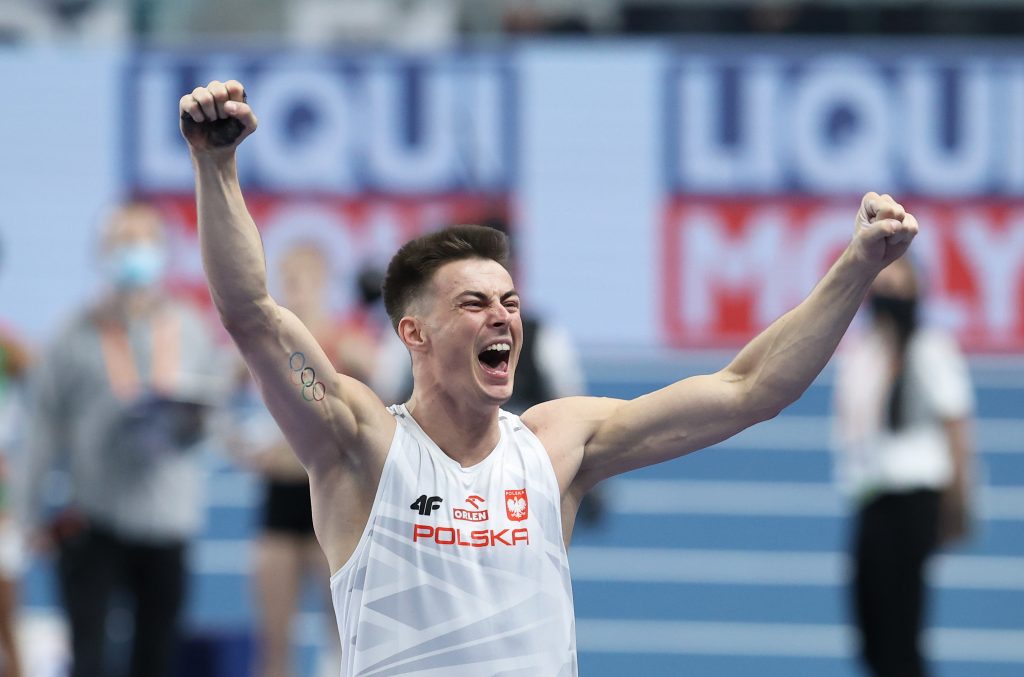
After 6 events:
- Kevin 5581
- Jorge 5319
- Paweł 5294
- Risto 5217
- Andreas 5203
- Rik 5185
- Dario 5008
- Darko 4988
- Simon 4566
- Maksim 4169
1000m
1000m maths is the best kind of maths.
Q: If Jorge is 25 points ahead of Paweł, and Paweł is 77 points ahead of Risto, but Rik is 32 points behind Risto and 5 seconds faster than Paweł, can Rik win a bronze medal?
A: It could happen!
What a run from Rik Taam!
Going into the race, Kevin was 262 points ahead, giving him 20+ seconds spare for the gold medal. He had time to stop, take his shoes off and put them back on again if he had wanted to. He didn’t need to do that, but Andreas Bechmann did. As the German kicked off the line at the gun, his right shoe was left on the track, as if caught in quicksand. Unperturbed, he ran the entire race with only one shoe, still managing a respectable 2:47.51.
But up front, Rik Taam was running like a bat out of hell. After 200m he was 1 second ahead of the pack. Then he kicked and left the field for dead. He was 4 seconds ahead after 400m, 6 seconds ahead after 600m, 7 seconds after 800m and almost 8 seconds when he crossed the line.
Taam finished in a PB of 2:35.35, leapfrogging the one-shoed Bechmann in 6th and Risto Lillemets in 5th and coming perilously close to snatching the bronze from Paweł Wiesiołek.
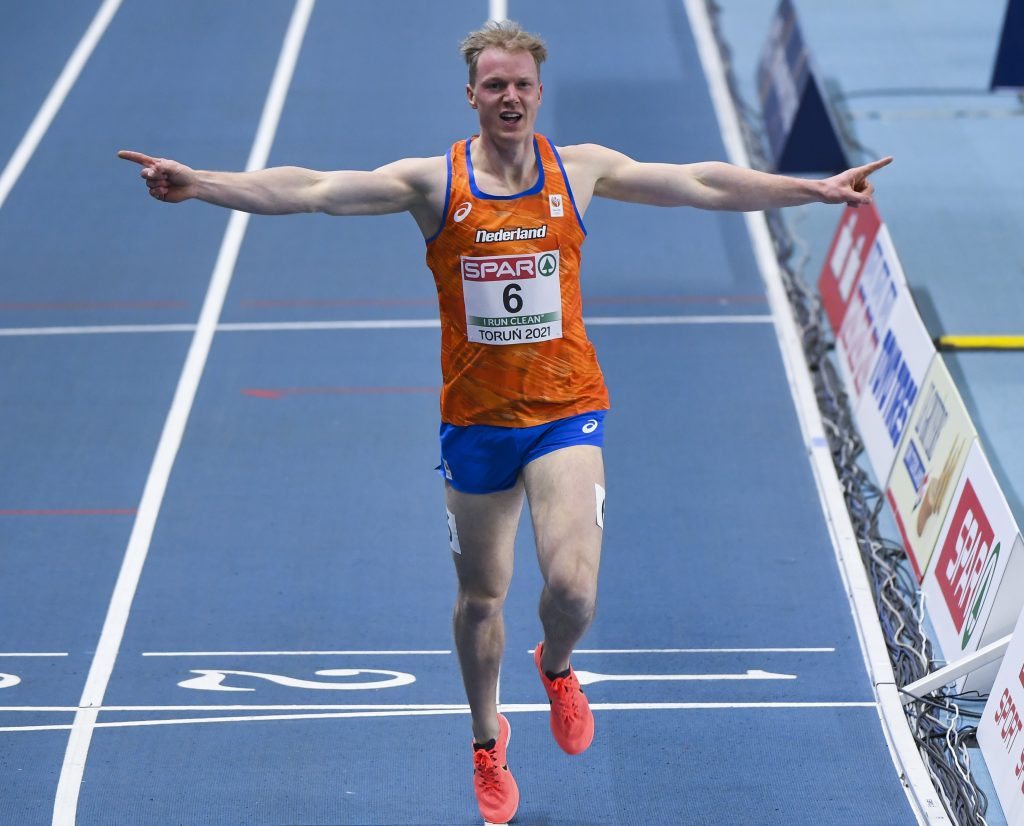
But Paw was having none of it. He had to make up the equivalent of 3 seconds on Jorge to move from bronze to silver. Jorge has a marginally faster lifetime best, by about a second, but there wasn’t much in it. Could Paweł channel the home stadium advantage and break the Spaniard? Would Jorge’s leg hold up to another last lap sprint like he did to secure gold in Glasgow?
Suddenly, the performance of the world record holder became the least interesting thing about the competition. Thankfully, with a Polish medal at stake, the Polish cameras followed the action. Paweł had a dual challenge – chasing down Jorge (running behind him) for a silver, while he himself was being chased by Rik Taam (running ahead of him) for bronze.
But Jorge was not giving away silver, and his characteristic last lap burst kept him within centimetres of Paweł on the line. And Paweł had done enough to fend off the Dutchman – just. As the Pole and Spaniard crossed the line simultaneously, only 25 points separated Jorge and Paweł in the final scores, and only 22 points separated Paweł and Rik. Less than 50 points between silver and 4th place.
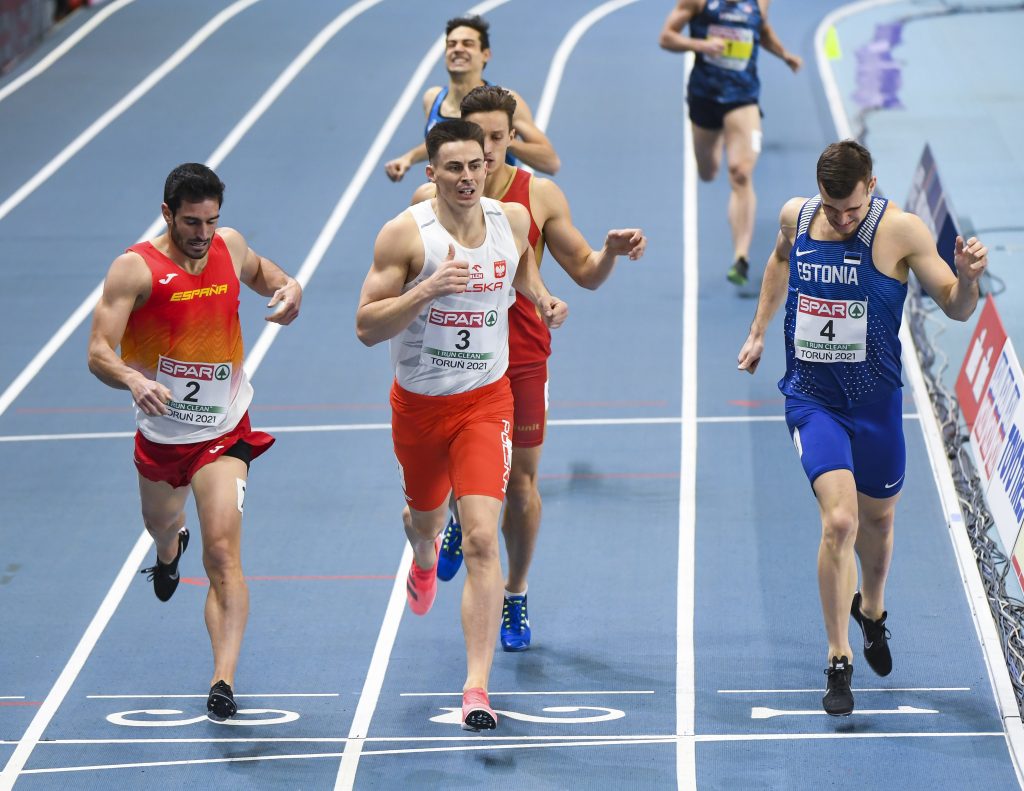
Paweł was rewarded with a 30 point PB of 6133 and bronze, and Rik a 110 point lifetime best of 6111. Kevin took gold with a final score of 6392, and Jorge silver with 6158.
A delighted Paweł said afterwards, “It is my first medal in my international career and I won it in Poland, my country. I have been waiting for it for 12 years, it’s a fantastic feeling and for sure it’s the best day in my sport life.”
After the competition, Rik Taam also reflected on his preparation for the championships, and chasing Wiesiołek in the final event. “I knew my score of 6001 would normally be good for qualification. But in the weeks after, many great athletes showed awesome strength. Then in the last weekend, Dester and Cairoli truly blasted the heptathlon in Italy. At that time I knew I was 7th on the indoor list, and I heard I was the first reserve. But my coach said we needed to prepare for the champs, so I did. Shortly after, I got confirmation that Zhuk would not start.”
“I had nothing to lose and everything to gain and so I went all in every event, and it brought me my best heptathlon ever! I really wanted to score 6100+ points and that was my biggest motivation. I knew Paweł was ahead and he is very experienced – he would not let me get away with 10 second. So I was really focused on 6100+ and that is why I am so happy with the performance. It feels like I won gold! I showed the best version of myself – my first senior competition with the guys was a blast and I can’t wait to do it all over again!”
Final results:
- Kevin 6392
- Jorge 6158
- Paweł 6133
- Rik 6111
- Risto 6055
- Andreas 5995
- Dario 5835
- Darko 5824
The top 8 men secured rankings points to contribute to Olympic qualification, although Mayer doesn’t need them since he already has the standard (as does Kazmirek). The athletes earned every one of those points. But only 8 men finished the competition, a typical drop-out rate. What a shame more athletes did not have the opportunity to compete.
Simone Cairoli’s lifetime best of 5986 from February would have been good enough for 7th, as would Yury Yaremich’s 5950, Andri Oberholzer’s 5940, Fredrik Samuelsson’s 5931, Adam Sebastian Helcelet’s 5913 and Jérémy Lelièvre’s 5863.
With 9 heats of the 60m, 9 heats of the 400m and 6 heats of the 800m taking place, plus long breaks between sessions, would it really have been so hard to squeeze 4 more athletes into the multis? If World Athletics insist on athletes securing ranking points for Olympic qualification, is it fair for governing bodies to limit the fields, and hence limit the access to points in this way?
But congratulations to the organisers for ensuring that the championships could take place at all. Any safe competition is better than no competition, and it is wonderful to see the return of major championships to the schedule.
Looking forward to the Olympics, the world record holder Kevin Mayer summed up his feelings:
“It is really a great feeling, not because of the medal, but because of my feeling during those two days. Since the World Indoor Championships in 2018 I have not medalled anymore. So it is really a pleasure for me. I didn’t show what I have in me for the sprints. But my time will come. All I think about are the Olympics. I need to trust my coach and my team, who just want the best for me. I am not really training for the 1000m anymore because we are focused on the speed training. Because I wanted to be good in 9 events and not only in one. The 1000m is always so stressful.”
“It is the beauty of the multi events. Each time we finish we have the impression, to have achieved something great.”
For now, the “Masters” won gold, silver and bronze, the “Youngsters” 4th, 5th and 6th. The Masters prevailed…this time. See you in the summer for the rematch.
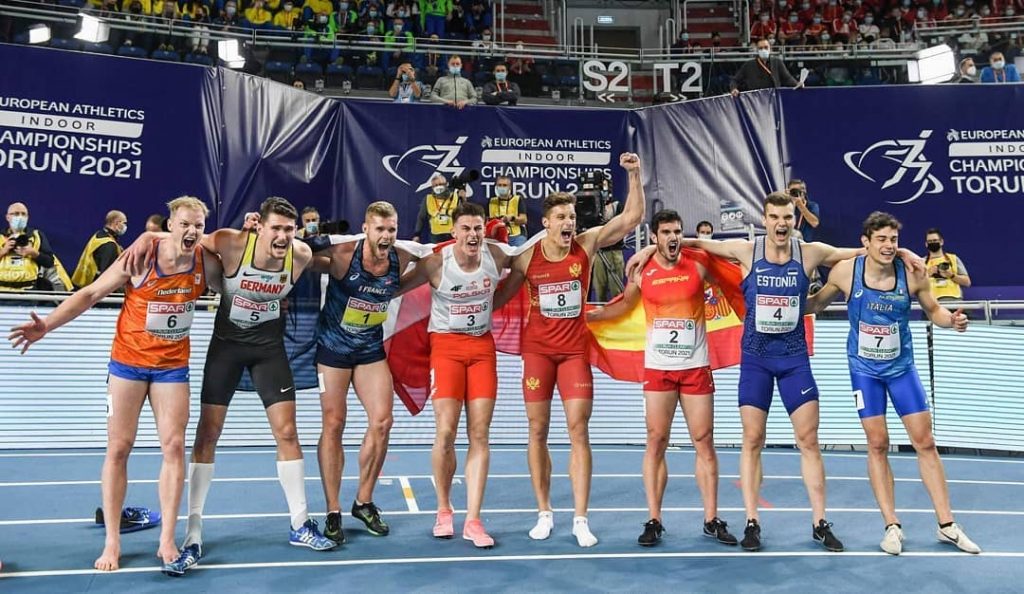
Photos: Getty Images for European Athletics (unless otherwise credited).


